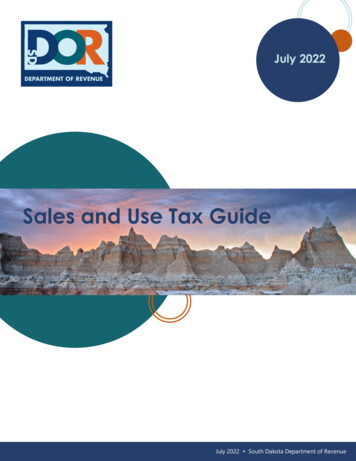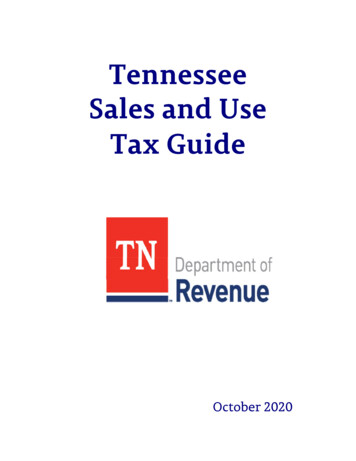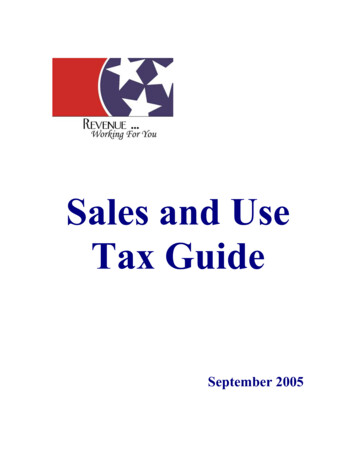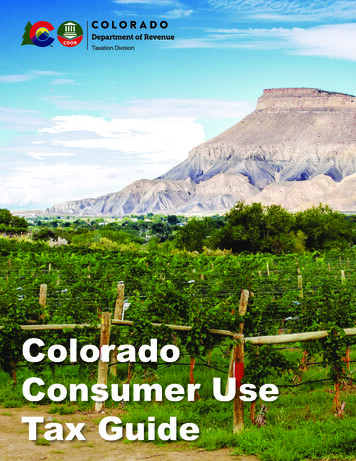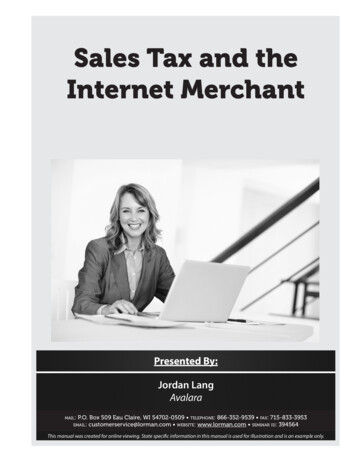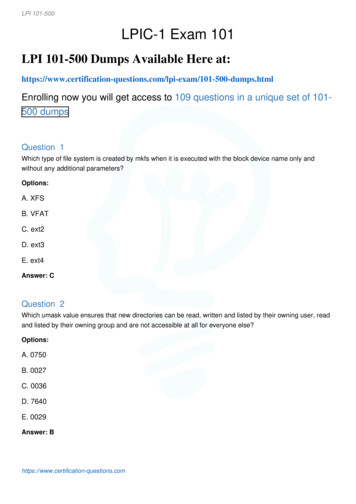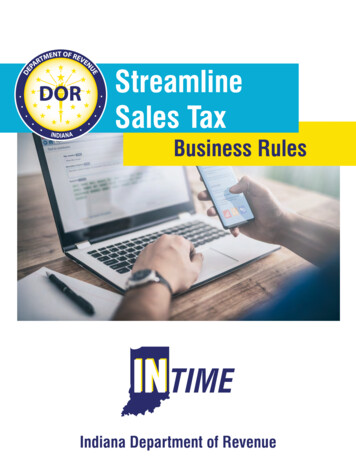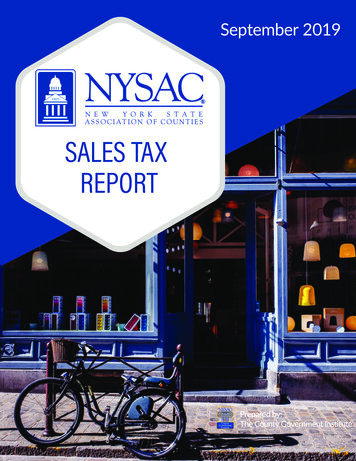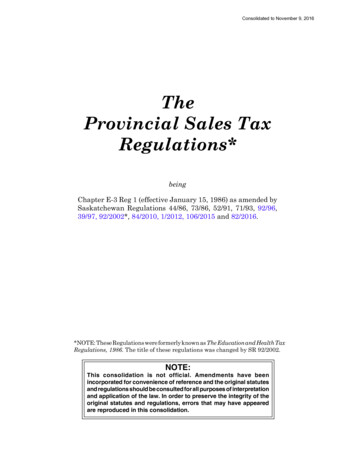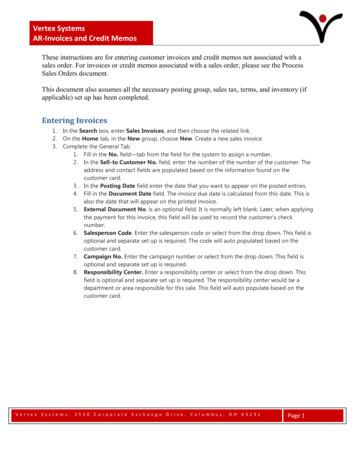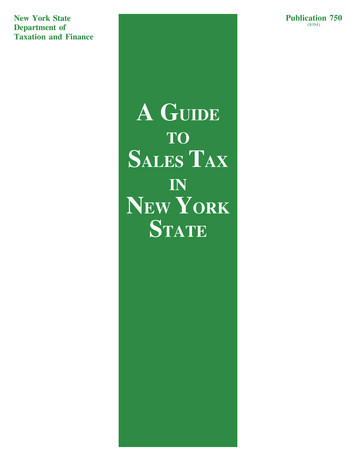
Transcription
Publication 750New York StateDepartment ofTaxation and Finance(8/04)A GUIDETOSALES TAXINNEW YORKSTATE
About this publicationPublication 750 is a guide to New York State and local sales and use taxes.This publication will assist you in deciding whether or not you are required to register as a vendor forNew York State sales tax purposes. If you are a farmer, contractor, or manufacturer, for example, thispublication will help you determine whether you must apply to register as a vendor with the TaxDepartment. As used in this publication and for purposes of the Tax Department’s registration rules, theterm vendor includes persons required to collect sales tax on sales and transactions described in Part II,Making sales. Also, when used in this publication, the terms sales, purchases, taxable sales, andtaxable purchases, include, but are not limited to, where appropriate, rentals of hotel rooms, admissionsto places of amusement, dues paid to social or athletic clubs, and charges of a roof garden, cabaret, orother similar place.Once you are registered as a vendor, you are responsible for collecting and remitting both state and localsales taxes to the Tax Department, along with any compensating use tax you may owe. Thispublication, therefore, includes information about local sales and use taxes, as well as New York Statesales and use taxes.Although this publication explains many aspects of these taxes, every situation that could occur is notcovered. For example, the sale of items through vending machines is not addressed in this publication.If you have any questions about sales and use tax, please contact us. See the Need help? section on theback cover of this publication.In addition to being required to apply to become a registered vendor for sales tax purposes, you mayalso be subject to the registration, collection, or payment requirements of other taxes. For a moredetailed description of these taxes, see Publication 20, New York State Tax Guide for New Businesses.Although accurate, the information in this publication has been simplified. If there is any discrepancybetween it and the Tax Law or regulations, the Tax Law and regulations will govern.
Publication 750 (8/04)Table of contentsPart I - RegistrationWho must be a registered vendor . . . . . . . . . . . . . . . . . . . . . . . . . . . . . . . . . . . . . . . . . . . 7Rules for out of state businesses . . . . . . . . . . . . . . . . . . . . . . . . . . . . . . . . . . . . . . . . . . . . 8About your Certificate of Authority . . . . . . . . . . . . . . . . . . . . . . . . . . . . . . . . . . . . . . . . . . 9Types of Certificates of Authority . . . . . . . . . . . . . . . . . . . . . . . . . . . . . . . . . . . . . . . . . . . 9How to obtain your Certificate of Authority . . . . . . . . . . . . . . . . . . . . . . . . . . . . . . . . . . 12Denial of a Certificate of Authority . . . . . . . . . . . . . . . . . . . . . . . . . . . . . . . . . . . . . . . . 13Taxpayers’ Bill of Rights . . . . . . . . . . . . . . . . . . . . . . . . . . . . . . . . . . . . . . . . . . . . . . . . 14New Jersey and Connecticut sales tax agreements . . . . . . . . . . . . . . . . . . . . . . . . . . . . . 14Registration rules for farmers . . . . . . . . . . . . . . . . . . . . . . . . . . . . . . . . . . . . . . . . . . . . . 15Registration rules for contractors . . . . . . . . . . . . . . . . . . . . . . . . . . . . . . . . . . . . . . . . . . . 15Registration rules for manufacturers . . . . . . . . . . . . . . . . . . . . . . . . . . . . . . . . . . . . . . . 15Part II - Making salesTaxable sales . . . . . . . . . . . . . . . . . . . . . . . . . . . . . . . . . . . . . . . . . . . . . . . . . . . . . . . . . . 17Sales of tangible personal property . . . . . . . . . . . . . . . . . . . . . . . . . . . . . . . . . . . . . . . . 17Sales of specifically enumerated services . . . . . . . . . . . . . . . . . . . . . . . . . . . . . . . . . . . 18Additional sales taxes and other fees you may be required to collect . . . . . . . . . . . . . . 19Sales taxes imposed only within New York City . . . . . . . . . . . . . . . . . . . . . . . . . . . . . . 19Sales taxes imposed by certain school districts . . . . . . . . . . . . . . . . . . . . . . . . . . . . . . . 20Calculating and stating the sales tax . . . . . . . . . . . . . . . . . . . . . . . . . . . . . . . . . . . . . . . . 20Exempt sales – No exemption certificate required . . . . . . . . . . . . . . . . . . . . . . . . . . . . . 23Exempt purchasers . . . . . . . . . . . . . . . . . . . . . . . . . . . . . . . . . . . . . . . . . . . . . . . . . . . . . 23Exemption certificates . . . . . . . . . . . . . . . . . . . . . . . . . . . . . . . . . . . . . . . . . . . . . . . . . . . 25Tax remitted based on accrual method of accounting . . . . . . . . . . . . . . . . . . . . . . . . . . . 26Taxable business purchases . . . . . . . . . . . . . . . . . . . . . . . . . . . . . . . . . . . . . . . . . . . . . . . 26Part III - Record keepingRecord keeping rules . . . . . . . . . . . . . . . . . . . . . . . . . . . . . . . . . . . . . . . . . . . . . . . . . . . 28Operators of parking facilities in Manhattan . . . . . . . . . . . . . . . . . . . . . . . . . . . . . . . . . 28Sales records . . . . . . . . . . . . . . . . . . . . . . . . . . . . . . . . . . . . . . . . . . . . . . . . . . . . . . . . . . 28Delivery records . . . . . . . . . . . . . . . . . . . . . . . . . . . . . . . . . . . . . . . . . . . . . . . . . . . . . . . 28Purchase records . . . . . . . . . . . . . . . . . . . . . . . . . . . . . . . . . . . . . . . . . . . . . . . . . . . . . . 29Maintaining records electronically . . . . . . . . . . . . . . . . . . . . . . . . . . . . . . . . . . . . . . . . 29Part IV - Filing your sales tax returnFiling requirements . . . . . . . . . . . . . . . . . . . . . . . . . . . . . . . . . . . . . . . . . . . . . . . . . . . . . 30Quarterly filing . . . . . . . . . . . . . . . . . . . . . . . . . . . . . . . . . . . . . . . . . . . . . . . . . . . . . . . . 30Monthly filing . . . . . . . . . . . . . . . . . . . . . . . . . . . . . . . . . . . . . . . . . . . . . . . . . . . . . . . . . 30Annual filing . . . . . . . . . . . . . . . . . . . . . . . . . . . . . . . . . . . . . . . . . . . . . . . . . . . . . . . . . . 31Reproducing returns and schedules . . . . . . . . . . . . . . . . . . . . . . . . . . . . . . . . . . . . . . . . 31Completing your sales tax return . . . . . . . . . . . . . . . . . . . . . . . . . . . . . . . . . . . . . . . . . . 32-5-
Publication 750 (8/04)Table of contents (continued)Part V - Show and entertainment promotersShow promoters . . . . . . . . . . . . . . . . . . . . . . . . . . . . . . . . . . . . . . . . . . . . . . . . . . . . . . . . 34Entertainment promoters . . . . . . . . . . . . . . . . . . . . . . . . . . . . . . . . . . . . . . . . . . . . . . . . . 36Part VI - Purchasing or acquiring a business or its assets-Caution . . . . . . . . . . 38Need help?. . . . . . . . . . . . . . . . . . . . . . . . . . . . . . . . . . . . . . . . . . . . . . . . . . . . . . . . . . . . . . Back cover-6-
Publication 750 (8/04)Part I – RegistrationWho must be a registered vendorYou must beregistered as avendor with the TaxDepartment if youwill be making salesof tangible personalproperty or serviceson which you arerequired to collectsales taxIf you will be making sales in New York State that are subject to salestax, you may be required to collect the sales tax from the person towhom you make the sale. (The discussion on page 17 under Taxablesales will help you in determining whether the sales you will be makingare subject to sales tax.) In general, the sales tax you must collect andremit is computed using the combined state and local rate in effect inthe locality where you deliver the taxable product or service. See page21 of this publication for information on the collection of tax on sales ofmotor vehicles and vessels.You must also beregistered as avendor to issue oraccept mostNew York State salestax exemptioncertificatesIf you must collect sales tax on the sales you make, then you mustregister as a vendor with the Tax Department and obtain a Certificate ofAuthority (see page 9). You must also be registered as a vendor to issueor accept most New York State sales tax exemption documents. Forexample, even though wholesalers may never collect sales tax becauseall of their purchases and sales are for resale (and, therefore, are eligiblefor exemption from sales tax), they must still be registered to legallyissue and accept most exemption documents.If you engage inbusiness withoutobtaining a validCertificate ofAuthority, you willbe subject to asubstantial penaltyIf you are required to register as a vendor but fail to do so and youengage in business without having obtained a valid Certificate ofAuthority, you will be subject to a penalty. The maximum penalty forengaging in business without obtaining a valid Certificate of Authorityis 10,000, imposed at the rate of up to 500 for the first day business isconducted without having obtained a valid Certificate of Authority, plusup to 200 per day for each day thereafter.If you are changingyour organizationalstructure, you mustregister as a newbusinessIf you change your organizational structure (for example, from a soleproprietorship to a corporation, a limited liability company, or apartnership), the new organization must register as a vendor and obtaina new Certificate of Authority. The new business must obtain its ownCertificate of Authority before it begins operating. You must also file afinal return for your existing business and surrender the Certificate ofAuthority that was issued to the existing business.Purchasing anexisting businessIf you are purchasing either part or all of the assets of an existingbusiness, there are specific rules that apply to the transaction (seepage 38).-7-
Publication 750 (8/04)Rules for out of state businessesEven though you arelocated in another state,if you have customers inNew York State, you maybe considered a vendorfor New York State salestax purposesEven though you are located outside of New York State, if you havecustomers in New York State, you may be required to register as avendor for New York State and local sales tax purposes, if you havesufficient connection with New York State. For example, if you arelocated outside New York State, make sales of taxable products topersons within New York State, and regularly deliver the products inyour trucks to your New York State customers, you have sufficientconnection with New York State and must register as a vendor andcollect and remit sales tax. Also, if you solicit sales of taxableproducts or services through employees, salespersons, independentagents, or service representatives located in New York State, you mustregister as a vendor for New York State sales tax purposes.If the only connection you have with New York State is the delivery ofyour products into the state by U.S. Postal Service or common carrier,you are not required to register or collect sales tax. Thus, some out ofstate businesses (including some mail order companies) may not havesufficient connection with New York State to be required to collectand remit sales tax.Although, as an out of state business, you may not be required tocollect sales tax from your customers in New York State, yourcustomers are still responsible for the tax on their purchases. The usetax complements the sales tax; one of the times it applies is when aNew York resident purchases taxable products or services outside ofNew York State and then brings them into New York for use here. Formore information, please see Publication 774, Purchaser’s Obligationsto Pay Sales and Use Taxes Directly to the Tax Department: Questionsand Answers.Although you may not have sufficient connection withNew York State to require you to be registered, you may voluntarilyregister as a vendor to collect and remit the sales tax that is otherwisedue from the purchaser. You will then have the same obligations asvendors that are required to register with the Tax Department.If you are required to register as a vendor, or if you voluntarilyregister, you must collect sales tax on all your taxable sales deliveredby you, or for you, to the purchaser, or the purchaser’s designee, inthis state. The tax due is the combined state and local rate in effect inthe locality where the taxable product or service is delivered.-8-
Publication 750 (8/04)About your Certificate of AuthorityYour Certificate ofAuthority authorizesyou to collect sales taxon your taxable salesand to issue and acceptmost New York Statesales tax exemptioncertificatesYour Certificate of Authority authorizes you to collect sales tax onyour taxable sales and to issue and accept most New York State salestax exemption certificates. Exemption certificates are forms that arefilled out by a purchaser and given to the seller, so that the seller has arecord of why sales tax was not required to be collected on the sale towhich the certificate relates.You must prominentlydisplay your Certificateof Authority at yourplace of businessYou must prominently display your Certificate of Authority at yourplace of business. If you have no permanent physical location, youcan attach it to your truck, cart, wagon, stand, or other vehicle orfacility from which you conduct business.Your Certificate ofAuthority is nottransferableYour Certificate of Authority is not transferable or assignable. If youbuy an ongoing business, you must apply for your own certificate.(See page 38 for additional information on the rules regarding thepurchase of a business.) If you sell your business or cease doingbusiness, you must surrender your Certificate of Authority to the TaxDepartment. Complete the back of the certificate as indicated andsend it with your final return to the address shown on the return.Once you receive your Certificate of Authority, you are considered tobe in business for sales tax purposes even if you never make a sale ornever open the doors of your establishment. Therefore, it is importantthat you file your sales tax returns on time, even if you did not haveany taxable sales during the reporting period, to avoid being subject topenalties for not filing.Although your Certificate of Authority is not transferable orassignable, it may be amended to account for changes in the address ofthe business or business name.You will not have to renew your Certificate of Authority unless youare notified to do so by the Tax Department.Types of Certificates of AuthorityThe Tax Departmentissues three types ofcertificates of authorityfor sales tax purposesThe Tax Department issues three types of Certificates of Authority forsales tax purposes: regular show/entertainment and temporaryThe type of Certificate of Authority you apply for should be based on thetype of business you will engage in and the anticipated duration of yourbusiness activities.-9-
Publication 750 (8/04)Regular Certificate ofAuthorityYou should apply for a regular Certificate of Authority if you will bemaking taxable sales from your home, a shop, a store, a cart, a stand, orany other facility or facilities from which you regularly conduct yourbusiness. It does not matter whether you own or rent the facility.You should apply for a regular Certificate of Authority if you sell atshows or entertainment events and also regularly make sales other thanat a show or entertainment event (for example, you make sales from apermanent location). You can use a regular Certificate of Authority atboth your permanent location and at shows and entertainment events.You may not use photocopies of Certificates of Authority, but you mayrequest duplicate originals of your Certificate of Authority. You mayrequest duplicate originals by attaching a separate note to yourapplication stating the number of additional Certificates of Authorityyou want or, if you have already received your Certificate of Authority,you may call or write us and request duplicate originals. (See the Needhelp? section on the back cover of this publication.)You must apply for a regular Certificate of Authority at least 20 daysbefore you begin operating your business in New York State.Certificate ofAuthority for Showand EntertainmentVendorsYou should apply for a Certificate of Authority for Show andEntertainment Vendors if your only business activities in the state willbe operating as a show or an entertainment vendor. The Certificate ofAuthority for Show and Entertainment Vendors is issued and is valid forthe current calendar year only. If you file your sales tax returns on timeand pay the amount of sales tax due, the Tax Department willautomatically renew your Certificate of Authority for Show andEntertainment Vendors for the next calendar year.Show vendorsYou are a show vendor if you display tangible personal property forsale or make taxable sales of tangible personal property or services at ashow at which more than one vendor displays items for sale, or makestaxable sales of tangible personal property or services. The term showincludes, but is not limited to, flea markets, craft shows, antique shows,coin shows, stamp shows, comic book shows, fairs and similar shows,whether the show is a regular or temporary event.Entertainment vendorsYou are an entertainment vendor if you only conduct business at anentertainment event being held in this state at which you displaytangible personal property for sale, or make sales of tangible personalproperty that are subject to sales tax at that event.The term entertainment event includes, but is not limited to: danceperformances or theatrical productions; athletic contests or exhibitions(other than an amateur sports competition); folk, rock, pop, symphony,or other music concerts; dramatic plays or musical shows; carnivals orcircus performances; rodeos; stand-up comedy acts; beauty pageants;boxing or wrestling matches or exhibitions; body building or weightlifting competitions; auto races; drag races; tractor pulls; roller derbies;-10-
Publication 750 (8/04)mud wrestling; track meets; horse shows; dog shows; golf tournaments;tennis tournaments; and other similar forms of entertainment. Abaseball game or other professional team sporting event will beconsidered an entertainment event if in a yearly period at least one ofthe participating teams has played four or fewer games at the samefacility. In addition, in order to be an entertainment event, the facilitywhere such event is held must have an attendance capacity of greaterthan 1,000 persons.The term entertainment event does not include events such as highschool or college athletic games, little league games, or festivalsfeaturing amateur sporting events. In the case of concerts, plays, showsor other similar forms of entertainment, the term entertainment eventdoes not include an event that consists of more than three performancesby the same person or persons during a weekly period at the samefacility or site. In the case of an athletic contest or exhibition, the termentertainment event does not include such competition between teamswhen at least one of the participating teams compete at the same facilityor site more than four times a year. For example, a professionalbaseball, football, basketball, or hockey game is not considered to be anentertainment event if at least one of the teams participating in thecompetition plays a regular schedule of more than four events at thefacility where the event is held.You must apply for a Certificate of Authority for Show andEntertainment Vendors at least 20 days before your first scheduledshow or entertainment event in New York State.Temporary Certificateof AuthorityYou may apply for a temporary Certificate of Authority if you expect tomake taxable sales in New York State for no more than two consecutivequarterly sales tax periods in any 12-month period. In determiningwhether you meet this criteria, keep in mind that the sales tax quartersare: March 1 through May 31, June 1 through August 31, September 1through November 30, and December 1 through February 28(February 29 in a leap year). However, even if you are eligible toobtain a temporary Certificate of Authority, it may be to your benefit toapply for a regular Certificate of Authority. That is because atemporary Certificate of Authority is only good for the two consecutivequarterly sales tax periods listed on your application and on yourtemporary Certificate of Authority. If you operate a business during thenext 12-month period, you must again apply for a new temporaryCertificate of Authority at least 20 days before you resume doingbusiness.For example, if you sell Christmas trees in November and December,and your taxable sales consist only of sales during this period, you areeligible to apply for a temporary Certificate of Authority. However, ifyou are involved in this type of business activity every year, you mayapply for a regular Certificate of Authority. This could be to yourbenefit, because you would then not have to apply every year for a new-11-
Publication 750 (8/04)temporary Certificate of Authority, as the regular Certificate ofAuthority would continue to be in effect until you indicate that you areno longer doing business by filing a final return. However, once youreceive a regular Certificate of Authority you must file sales and use taxreturns even if you have no sales tax liability. Also, even if you file afinal return, and subsequently change your plans, you may apply forreactivation of your regular Certificate of Authority simply by calling1 800 972-1233 (as long as it is within one year of deactivation).Consider, for example, a person who has no consistent year-to-yearsales activity in New York State. In 2003, this person sold costumejewelry from a kiosk in the common area of a mall from Octoberthrough December. This was this person’s only business activity inNew York State in 2003. The person did not anticipate doing businessin New York State in 2004. The person in this example should applyfor a temporary Certificate of Authority.Next, consider the example of a person who will be selling crafts at afarmers’ market for seven months, from the beginning of April throughthe end of October. This seven-month period covers three consecutivequarterly sales tax periods: March through May, June through August,and September through November. This person may not register as atemporary vendor. He or she must apply for either a regular Certificateof Authority, or a Certificate of Authority for Show and EntertainmentVendors.You must apply for a temporary Certificate of Authority at least 20days before you begin operating your business.How to obtain your Certificate of AuthorityTo obtain a Certificate of Authority, fill out Form DTF-17, Applicationfor Registration as a Sales Tax Vendor, for your business and send it tothe address listed in the instructions for that form, at least 20 daysbefore you begin operating your business.You may obtain a copy of the application form from the TaxDepartment’s Web site or by contacting us. See the Need help? sectionon the back cover of this publication.The Tax Department will review your application. If the application isapproved, we will mail you a Certificate of Authority. You cannotlegally make taxable sales or issue or accept most exemptioncertificates until you have received your valid Certificate of Authority.If you listed several places of business on Form DTF-17-ATT, Scheduleof Business Locations For a Consolidated Filer, the Tax Departmentwill provide you with a valid Certificate of Authority for each location.-12-
Publication 750 (8/04)Denial of a Certificate of AuthorityThe Tax Departmentmay deny your requestfor a Certificate ofAuthorityThe Tax Department may deny your request for a Certificate ofAuthority under certain circumstances. For example, if any tax imposedunder the Tax Law has been finally determined to be due from you andthat tax liability has not been paid, your application for a Certificate ofAuthority may be denied. Remember that you cannot legally maketaxable sales or issue or accept most New York State exemptioncertificates until you receive a valid Certificate of Authority.Within 90 days ofreceiving notice thatyour application for aCertificate ofAuthority has beendenied, you may fileeither a request for aconference, or apetition for a hearingIf your application for a Certificate of Authority is denied, we will sendyou a Notice of Proposed Refusal to Register by certified mail withinfive days of the date we receive your application. The Notice ofProposed Refusal to Register will state the basis for such proposedrefusal. If you believe that the Tax Department has made a mistake,you should file a request for a conference with the Bureau ofConciliation and Mediation Services, or file a petition for a hearingwith the Division of Tax Appeals. You must file the application for aconference or hearing within 90 days of the date of the Notice ofProposed Refusal to Register, otherwise the Notice of Proposed Refusalto Register shall become final. Once the Notice of Proposed Refusal toRegister becomes final you are prohibited from engaging in anybusiness in New York State for which a Certificate of Authority isrequired.Conciliation conferenceYou may request a conciliation conference through the Bureau ofConciliation and Mediation Services. The conference is conductedinformally by a conferee who issues an order that is binding on the TaxDepartment, but not on you. (You may appeal the order by filing apetition for a formal hearing with the Division of Tax Appeals, asexplained below.)To set up a conference, file Form CMS-1, Request for ConciliationConference, which is included with the Notice of Proposed Refusal toRegister you receive. You may also obtain this form by calling toll free1 800 462-8100, or by writing to the Bureau of Conciliation andMediation Services, NYS Tax Department, W A Harriman Campus,Albany NY 12227.Hearing with theDivision of Tax AppealsYou may file a petition with the Division of Tax Appeals for a hearingbefore an administrative law judge. Both you and the Tax Departmenthave the right to appeal the administrative law judge's decision to theTax Appeals Tribunal. You may obtain petition forms by visiting theTribunal’s Web site at www.nysdta.org, by calling the Tribunal at(518) 266-3000, or by writing to the Division of Tax Appeals,Riverfront Professional Tower, 500 Federal Street, 4th Floor, Troy NY12180-2894.-13-
Publication 750 (8/04)The Tax Department cannot seek a review of the Tribunal's decision.You, however, can seek a review by instituting an Article 78proceeding in the Appellate Division of the New York State SupremeCourt.Powers of AttorneyRegardless of which appeal option you choose, you may appear on yourown behalf or have an authorized representative present your case forreview. An authorized representative must have power of attorney fromyou on file with the office in which the matter is pending, in order toappear on your behalf.Taxpayers’ Bill of RightsThe Taxpayers’ Bill ofRights requires the TaxDepartment to adviseyou, in writing, of yourrights to appeal adepartmental decisionNew York State has a Taxpayers’ Bill of Rights that enhances andformalizes your rights as a New York State taxpayer. In part, the Billof Rights requires the Tax Department to advise you, in writing, ofyour rights to appeal a departmental decision. For more informationon your rights, call or write us. See the Need help? section on the backcover of this publication. See Publication 38, Your Rights as aTaxpayer.New Jersey and Connecticut sales tax agreementsA simplified taxreporting program ispart of separateagreements entered intobetween New York Stateand New Jersey, andNew York State andConnecticutA simplified sales tax reporting program is part of separate agreementsentered into between New York State and the State of New Jersey, andNew York State and the State of Connecticut.Registering for theprogramVendors who participate in the program register with both their homestate, and the state(s) for which they wish to collect sales tax. Thevendor files a single sales tax return with the home state, along with acombined payment of all sales taxes collected and a breakdown of howmuch tax was collected on behalf of each state. The home state will,on the vendor’s behalf, send the taxes due the other state(s) to thatstate(s). For more information on registering for the New Jersey orConnecticut programs, see Publication 32, New Jersey/New YorkCooperative Interstate Sales and Use Tax Administration, (NewJersey) or Publication 904, Connecticut/New York State CooperativeInterstate Sales and Use Tax Administration, (Connecticut).Under the simplified tax reporting program, New York State vendorswho have no business location in New Jersey or Connecticut, but whomake taxable sales of tangible personal property or services that aredelivered to persons in New Jersey or Connecticut, may collect theNew Jersey or Connecticut sales tax due on those sales. Theagreement between the states also permits the states to activelyexchange sales and use tax information.-14-
Publication 750 (8/04)Registration rules for farmersA farmer is not requiredto register as a vendorfor sales tax purposesunless the farmer makessales that are subject tosales taxA farmer is not required to register as a vendor for sales tax purposesif the only sales the farmer makes are sales of food and food productsthat are exempt from tax. For example, if a farmer sells fruits,vegetables, baked goods, jellies, jams, and preserves at a roadsidestand, the farmer will not be required to register.If, however, a farmer sells taxable tangible personal property such asplants, shrubs, trees, homemade crafts, or items such as candy andother confections, or sells food or drink for consumption on thepremises where sold, then the farmer must register
customers in New York State, you may be required to register as a vendor for New York State and local sales tax purposes, if you have sufficient connection with New York State. For example, if you are located outside New York State, make sales of taxable products to persons within New York State, and regularly deliver the products in
